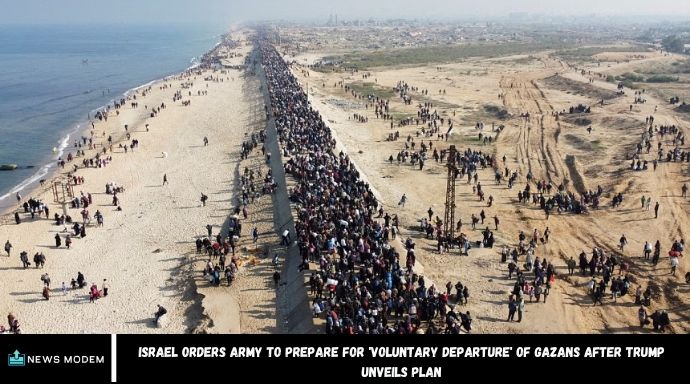Israel Orders Army to Prepare for ‘Voluntary Departure’ of Gazans After Trump Unveils Plan In a move that has stirred global attention, Israel has ordered its army to prepare for the voluntary departure of Gazans following the unveiling of former President Donald Trump’s peace plan. This strategic decision is raising important questions about the future of Gaza, Israeli security, and the broader Middle East peace process. As tensions in the region continue to escalate, this article delves into the key aspects of the Israel-Gaza conflict, the Trump administration’s plan, and the potential consequences of this major shift in Israeli policy.
Understanding the Context: Israel’s New Stance on Gaza
On the heels of President Trump’s controversial Middle East peace proposal, Israel has taken a significant step by preparing its army for the potential voluntary relocation of Gaza’s population. This directive aims to create a pathway for Palestinians to leave Gaza, whether by moving to other parts of the region or resettling elsewhere.
Why is This Decision Important?
The move is seen as an effort to reshape the political and demographic landscape of Gaza while addressing long-standing security concerns. It’s a critical component of Trump’s plan, which emphasizes regional stability and Israeli security through a two-state solution.
- Strategic Security Concerns: Israel has been struggling with security issues stemming from Gaza’s proximity and ongoing hostilities with militant groups.
- Peace Proposal Dynamics: Trump’s peace plan suggests land swaps, with Gaza potentially becoming part of a broader Israeli-Palestinian agreement.
What is the Trump Peace Plan?
The Trump peace plan, also known as the “Deal of the Century,” was unveiled in January 2020, aiming to resolve the Israeli-Palestinian conflict. It proposes a two-state solution but in a form significantly different from past efforts. One of its most controversial elements is the idea of voluntary departure, where certain parts of Gaza may become part of Israel or be reallocated to other neighboring countries.
- Gaza’s Role in the Plan: Under this plan, Gaza may not remain entirely under Palestinian control. Instead, parts could be annexed by Israel, or Palestinians may be encouraged to move elsewhere.
- International Reactions: The plan has been met with mixed reactions globally, with many countries supporting a negotiated peace, while others criticize it for favoring Israel’s position.
What Does This Mean for Gaza’s Population?
The idea of a voluntary departure of Gazans raises several concerns, both humanitarian and logistical. While the plan presents an opportunity for some to leave the region voluntarily, there are questions about the potential effects on Palestinian families and the future of Gaza’s inhabitants.
- Potential Resettlement Options: Palestinians would have to decide whether to move to other parts of the Palestinian Authority, Israel, or neighboring countries.
- Challenges of Relocation: While voluntary, the process may face difficulties in terms of infrastructure, resources, and regional cooperation.
Key Considerations:
- Economic Impact: Gaza’s economy has been severely affected by blockades and limited opportunities. Relocation could ease some of the pressure on daily life but could also lead to increased tensions elsewhere.
- Humanitarian Concerns: The logistics of a mass relocation could result in uncertainty about the welfare of Gazans, leading to humanitarian crises.
Implications for Peace and Stability
While the voluntary departure could be seen as a step toward long-term peace, its success hinges on a variety of factors, including international cooperation, Palestinian consent, and regional stability.
- A Two-State Solution: Trump’s plan still offers a two-state solution, but it’s controversial in its execution. Will Gaza’s departure lead to a lasting peace or deepen divisions?
- Global Involvement: The international community, particularly the United Nations and the European Union, will play a critical role in shaping the future of Gaza’s residents.
FAQs:
1. Why is Israel preparing for the voluntary departure of Gazans?
Israel is preparing in response to the Trump peace plan, which proposes a reshaping of borders and a potential voluntary relocation of Palestinians from Gaza.
2. What does Trump’s peace plan entail?
The plan includes a two-state solution with land swaps, the potential annexation of parts of Gaza by Israel, and the option for Palestinians to relocate.
3. Is the relocation of Gazans voluntary?
Yes, the plan calls for voluntary departure, but logistical and humanitarian challenges remain.
4. How would this impact Gaza’s population?
The move could alleviate some pressure but may also create challenges in terms of resettlement, economic instability, and displacement.
5. What are the international reactions to Trump’s plan?
Reactions are mixed, with some countries supporting the proposal, while others criticize it as unbalanced and harmful to Palestinian interests.
6. What role does Israel’s army play in this situation?
The Israeli army is being prepared for possible enforcement, ensuring the security and logistics of any voluntary relocation of Gaza’s residents.
Conclusion
Israel’s decision to prepare for the voluntary departure of Gazans after Trump’s plan introduces a bold approach to peace, but one that is fraught with complexities. It has the potential to reshape the geopolitical landscape of the Middle East but also carries significant humanitarian and logistical challenges. Only time will tell if this decision leads to the peace that many hope for or if it exacerbates existing tensions.

